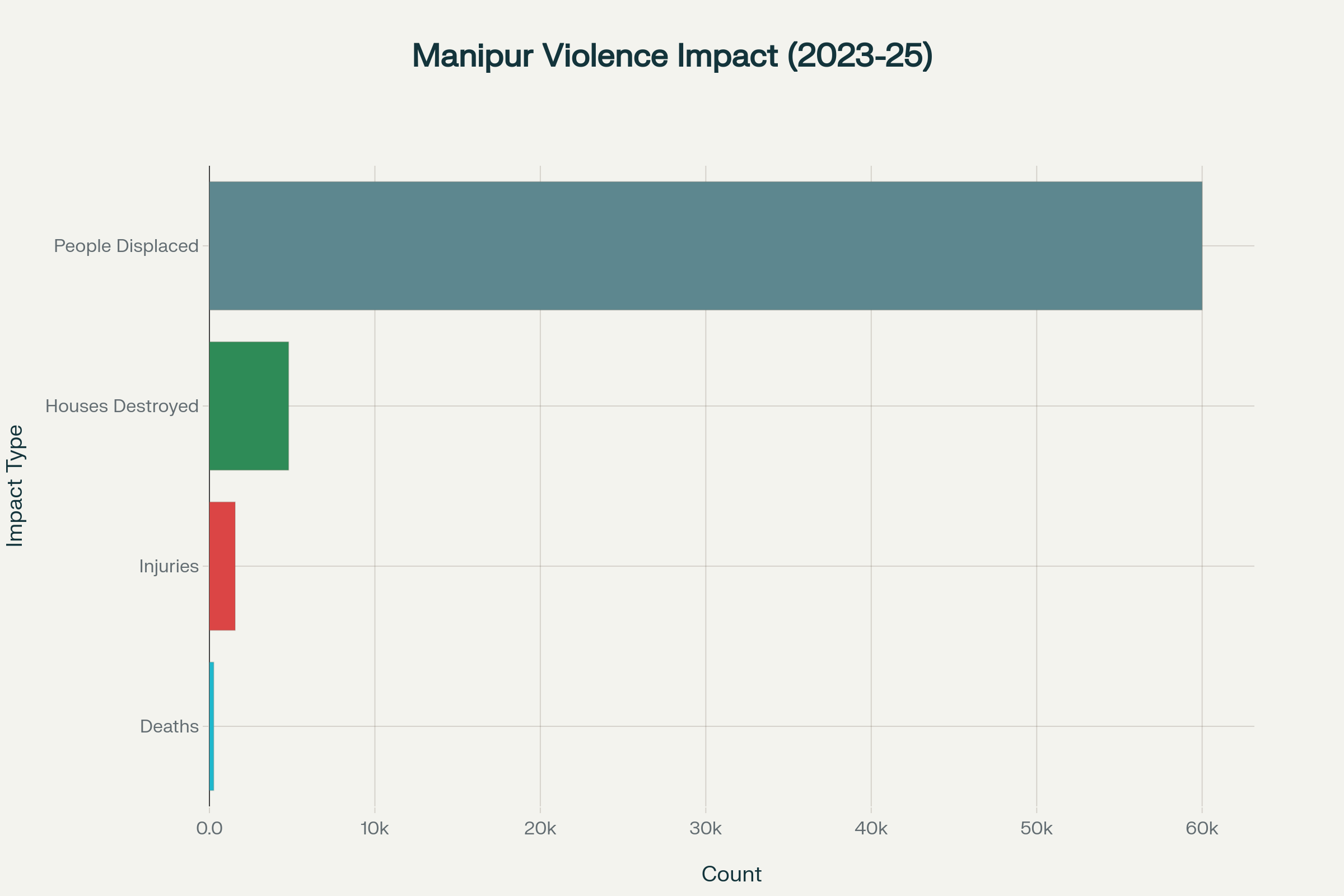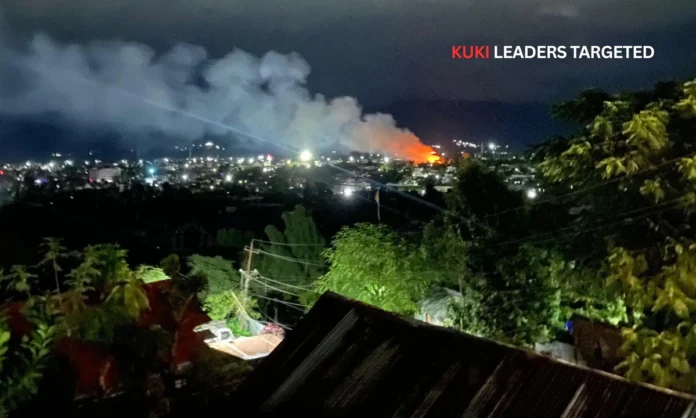Key Highlights:
- The house of Kuki National Organisation leader Calvin Aikhenthang was set ablaze in Churachandpur district, escalating tensions just days after PM Modi’s first visit to violence-hit Manipur
- A second Kuki leader Ginza Vualzong’s residence was also targeted, but locals intervened to prevent its destruction, highlighting ongoing ethnic fragility
- The incidents occurred following the recent signing of a revised Suspension of Operations agreement between the Centre and Kuki insurgent groups on September 4, 2025
Initial Context of Rising Tensions
The Kuki leader house fire incident in Manipur represents a dangerous escalation in ethnic tensions within Churachandpur district, occurring just one day after Prime Minister Narendra Modi’s first visit to the violence-torn state. The house of Calvin Aikhenthang, a prominent leader of the Kuki National Organisation, was allegedly torched by unidentified miscreants late Sunday night on September 15, 2025. This Kuki leader house fire incident in Manipur has raised serious concerns about the fragility of peace efforts in the region, particularly given the recent diplomatic breakthrough achieved through the revised Suspension of Operations agreement.
#BreakingNews
— Bikramjit Kangabam (@BikramjitMK) September 15, 2025
𝐓𝐡𝐞 𝐡𝐨𝐮𝐬𝐞 𝐨𝐟 𝐊𝐍𝐎 𝐥𝐞𝐚𝐝𝐞𝐫 𝐂𝐚l𝐯𝐢𝐧 𝐢𝐧 𝐂𝐡𝐮𝐫𝐚𝐜𝐡𝐚𝐧𝐝𝐩𝐮𝐫 𝐰𝐚𝐬 𝐚𝐥𝐥𝐞𝐠𝐞𝐝𝐥𝐲 𝐬𝐞𝐭 𝐚𝐛𝐥𝐚𝐳𝐞 𝐛𝐲 𝐚 𝐦𝐨𝐛⁉️
It’s a stark repercussion of giving false hopes of separate State/UT by engineering violence.
Let’s not forget:… pic.twitter.com/EDTfRv1n5I
Local authorities reported conflicting accounts of the incident, with some residents claiming the fire resulted from a short circuit rather than deliberate arson. However, the targeting of a second Kuki leader’s residence on the same night suggests coordinated attempts to destabilize the community leadership. The Kuki leader house fire incident in Manipur occurred in Churachandpur, the same district where the May 2023 ethnic violence first erupted, making this development particularly significant for regional stability.
The timing of these attacks, coming immediately after high-level peace negotiations and Prime Minister Modi’s appeal for harmony, underscores the deep-seated tensions that continue to plague Manipur despite official reconciliation efforts. Security forces have been placed on high alert following the Kuki leader house fire incident in Manipur, as authorities work to prevent further escalation between communities.
Peace Agreement Context and Recent Developments
- The revised Suspension of Operations agreement was signed on September 4, 2025, involving 24 Kuki, Zomi and Hmar insurgent groups under the Kuki National Organisation and United People’s Front
- Under the renegotiated terms, insurgent groups agreed to maintain Manipur’s territorial integrity, relocate camps from vulnerable areas, and pursue peaceful political solutions
The recent Kuki leader house fire incident in Manipur occurred against the backdrop of significant diplomatic progress, with the Centre successfully renegotiating the Suspension of Operations agreement after months of uncertainty. The agreement, originally signed in 2008, had faced challenges in 2024 when the Manipur government initially refused renewal, citing violations of ground rules and allegations that SoO groups had instigated the 2023 ethnic violence. The revised pact includes stricter monitoring provisions, with cadre verification by security forces and mandatory relocation of camps away from sensitive border areas between Kuki hills and Meitei valleys.
Government officials had expressed optimism that the renewed agreement would contribute to lasting peace in the region, with the Centre addressing several key Kuki demands while maintaining constitutional framework requirements. However, the Kuki leader house fire incident in Manipur demonstrates the continued volatility on the ground, despite formal political agreements at higher levels. The incident has particularly strained relations within Churachandpur district, where local Meitei civil society groups have historically opposed the SoO agreement, viewing it as legitimizing what they term “armed narco-terrorist groups”.
The timing coincidence with Prime Minister Modi’s historic visit, where he launched development projects worth nearly $1 billion and appealed for peace, has added political sensitivity to the Kuki leader house fire incident in Manipur. Officials are now working to prevent this incident from derailing broader peace initiatives that had shown promising momentum following the September 4 agreement.
Broader Violence Statistics and Impact Assessment
- Official government figures report 260 people killed in Manipur ethnic violence since May 2023, with over 60,000 individuals displaced from their homes
- The violence has destroyed 4,786 houses and vandalized 386 religious structures, including temples and churches across the state
- Approximately 1,555 individuals have sustained injuries during the conflict, including 1,429 civilians, 98 police personnel, and 28 Central Armed Police Force members

Comprehensive overview of Manipur ethnic violence casualties and destruction statistics from 2023-2025
The Kuki leader house fire incident in Manipur must be understood within the context of the devastating two-year ethnic conflict that has fundamentally altered the demographic landscape of the state. Since violence erupted in May 2023, the conflict has claimed 260 lives according to official government statistics, though human rights organizations suggest the actual toll may be higher. The displacement of over 60,000 people has created separate enclaves for Meitei and Kuki-Zo communities, with buffer zones monitored by security forces to prevent inter-community contact.
The scale of destruction extends far beyond human casualties, with thousands of homes and religious sites destroyed across the state. Union Home Minister Amit Shah revealed that 70 percent of the deaths occurred within the first 15 days of violence, indicating the rapid escalation and intensity of the initial ethnic clashes. The Kuki leader house fire incident in Manipur represents a concerning return to targeted violence against community leaders, potentially signaling efforts to derail peace processes through intimidation tactics.
Humanitarian organizations have documented widespread human rights violations, including sexual violence, forced displacement, and destruction of livelihoods, creating deep trauma that continues to influence community relations. The Kuki leader house fire incident in Manipur occurred in this highly charged atmosphere, where even minor incidents can rapidly escalate into broader communal tensions. Security forces have established extensive monitoring systems, but the incident demonstrates the challenges of maintaining peace when underlying grievances remain unresolved.
Highway Controversy and Administrative Challenges
- The Kuki-Zo Council initially announced the opening of National Highway-2 for free movement, but later clarified that no official reopening had been declared
- The highway serves as a critical lifeline for essential goods and commuters, but remains a contentious symbol of territorial control between communities
The Kuki leader house fire incident in Manipur has complicated ongoing negotiations regarding National Highway-2, a vital transportation corridor that has become symbolic of the broader territorial disputes between communities. The Kuki-Zo Council had initially indicated willingness to allow free movement along the highway as part of confidence-building measures following the September 4 peace agreement. However, the organization subsequently issued clarifications stating that the highway had never been officially blocked and that their cooperation was limited to specific security arrangements in Kangpokpi district.
The highway controversy illustrates the complex administrative challenges facing authorities as they attempt to restore normalcy while respecting community concerns about safety and territorial integrity. The Kuki leader house fire incident in Manipur has further complicated these delicate negotiations, as community leaders may now be reluctant to make concessions that could be perceived as compromising security. The KZC has emphasized that no free movement should occur between Meitei and Kuki-Zo areas until a comprehensive settlement is reached, warning that violations could lead to serious consequences.
Government officials are working to balance infrastructure needs with security concerns, recognizing that economic connectivity is essential for long-term peace building. The Kuki leader house fire incident in Manipur has reinforced community fears about vulnerability, potentially making future cooperation on highway access more difficult to achieve. Administrative authorities must now address both the immediate security implications of the house burning incident while maintaining momentum on broader infrastructure and connectivity initiatives.
Closing Assessment
The Kuki leader house fire incident in Manipur represents a critical test for the fragile peace process in the state, occurring at a moment when diplomatic progress had raised hopes for sustainable conflict resolution. The targeting of Calvin Aikhenthang’s residence, along with the attempted attack on Ginza Vualzong’s home, demonstrates that despite high-level agreements and official reconciliation efforts, ground-level tensions remain dangerously volatile. This incident threatens to undermine the recent Suspension of Operations agreement renewal and complicates ongoing efforts to restore normalcy through infrastructure connectivity initiatives.
The Kuki leader house fire incident in Manipur has exposed the limitations of formal peace agreements when underlying community grievances and territorial disputes remain unresolved. Security forces and political leaders must now work urgently to prevent this incident from triggering broader communal violence, while addressing the root causes that continue to fuel ethnic tensions in the region. The international community and human rights organizations will be closely monitoring the government’s response to this latest escalation, as it may determine whether Manipur can achieve lasting peace or faces a return to widespread ethnic violence.


